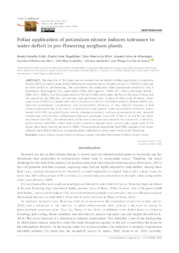Foliar application of potassium nitrate induces tolerance to water deficit in pre-flowering sorghum plants.
Foliar application of potassium nitrate induces tolerance to water deficit in pre-flowering sorghum plants.
Author(s): ÁVILA, R. G.; MAGALHAES, P. C.; SILVA, E. M. da; ALVARENGA, A. A. de; REIS, C. O. dos; CUSTÓDIO. A. M.; JAKELAITIS, A.; SOUZA, T. C. de
Summary: The objective of this study was to evaluate the the ability of foliar application of potassium nitrate (KNO3) to induce water deficit tolerance in sorghum plants (Sorghum bicolor cv. P898012) subjected to water deficit at pre-flowering. The experiment was conducted under greenhouse conditions with 4 treatments: field capacity (FC), water deficit (WD), field capacity + KNO3 (FC + KNO3), and water deficit + KNO3 (WD + KNO3). Two foliar applications of 3% (m/v) KNO3 were made, the first on day zero of stress and the second on the fifth day. All analyses were performed after 12 days of stress (end of stress). Foliar application of KNO3 to irrigated plants led to increases in relative chlorophyll content, photosynthetic rate, stomatal conductance, transpiration, and carboxylation efficiency. It also induced increases in leaf concentrations of P, Mg, S, Cu, and Fe, in addition to height growth. Under water deficit conditions, plants treated with KNO3 presented higher relative chlorophyll content, leaf area, photosynthetic rate, stomatal conductance, transpiration, carboxylation efficiency, and higher levels of P, K, Mg, S, Cu, and Fe than those not treated with KNO3. The morphometry of the root system was not altered by the treatments. In addition, plants treated with KNO3 under water deficit conditions showed higher growth and a grain yield 32.2% higher than those that did not receive KNO3. These results demonstrated that KNO3 applied to the leaves induced water deficit tolerance in sorghum plants subjected to severe water stress at pre-flowering.
Publication year: 2022
Types of publication: Journal article
Unit: Embrapa Maize & Sorghum
Observation
Some of Embrapa's publications are published as ePub files. To read them, use or download one of the following free software options to your computer or mobile device. Android: Google Play Books; IOS: iBooks; Windows and Linux: Calibre.
Access other publications
Access the Agricultural Research Database (BDPA) to consult Embrapa's full library collection and records.
Visit Embrapa Bookstore to purchase books and other publications sold by Embrapa.

